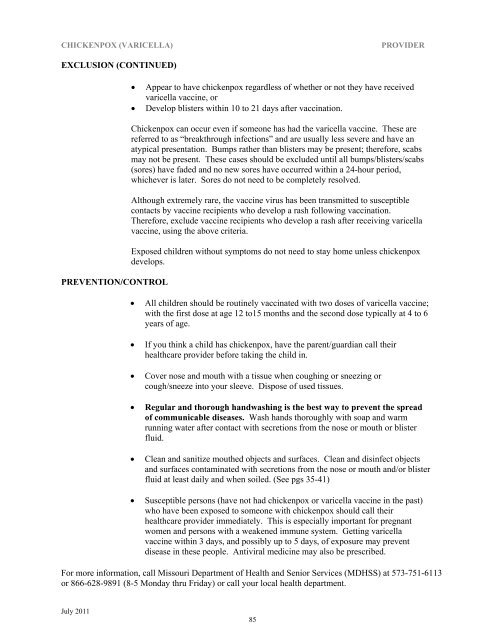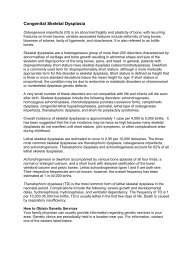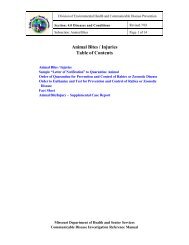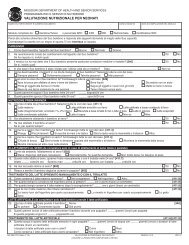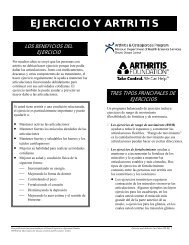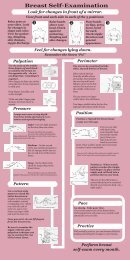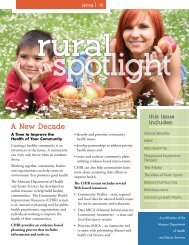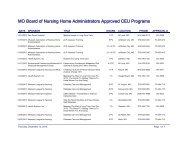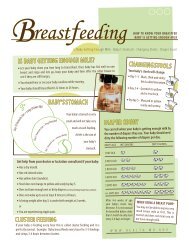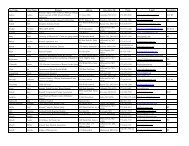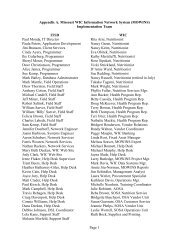Prevention and Control of Communicable Diseases - Missouri ...
Prevention and Control of Communicable Diseases - Missouri ...
Prevention and Control of Communicable Diseases - Missouri ...
You also want an ePaper? Increase the reach of your titles
YUMPU automatically turns print PDFs into web optimized ePapers that Google loves.
CHICKENPOX (VARICELLA) PROVIDER<br />
EXCLUSION (CONTINUED)<br />
PREVENTION/CONTROL<br />
July 2011<br />
� Appear to have chickenpox regardless <strong>of</strong> whether or not they have received<br />
varicella vaccine, or<br />
� Develop blisters within 10 to 21 days after vaccination.<br />
Chickenpox can occur even if someone has had the varicella vaccine. These are<br />
referred to as “breakthrough infections” <strong>and</strong> are usually less severe <strong>and</strong> have an<br />
atypical presentation. Bumps rather than blisters may be present; therefore, scabs<br />
may not be present. These cases should be excluded until all bumps/blisters/scabs<br />
(sores) have faded <strong>and</strong> no new sores have occurred within a 24-hour period,<br />
whichever is later. Sores do not need to be completely resolved.<br />
Although extremely rare, the vaccine virus has been transmitted to susceptible<br />
contacts by vaccine recipients who develop a rash following vaccination.<br />
Therefore, exclude vaccine recipients who develop a rash after receiving varicella<br />
vaccine, using the above criteria.<br />
Exposed children without symptoms do not need to stay home unless chickenpox<br />
develops.<br />
� All children should be routinely vaccinated with two doses <strong>of</strong> varicella vaccine;<br />
with the first dose at age 12 to15 months <strong>and</strong> the second dose typically at 4 to 6<br />
years <strong>of</strong> age.<br />
� If you think a child has chickenpox, have the parent/guardian call their<br />
healthcare provider before taking the child in.<br />
� Cover nose <strong>and</strong> mouth with a tissue when coughing or sneezing or<br />
cough/sneeze into your sleeve. Dispose <strong>of</strong> used tissues.<br />
� Regular <strong>and</strong> thorough h<strong>and</strong>washing is the best way to prevent the spread<br />
<strong>of</strong> communicable diseases. Wash h<strong>and</strong>s thoroughly with soap <strong>and</strong> warm<br />
running water after contact with secretions from the nose or mouth or blister<br />
fluid.<br />
� Clean <strong>and</strong> sanitize mouthed objects <strong>and</strong> surfaces. Clean <strong>and</strong> disinfect objects<br />
<strong>and</strong> surfaces contaminated with secretions from the nose or mouth <strong>and</strong>/or blister<br />
fluid at least daily <strong>and</strong> when soiled. (See pgs 35-41)<br />
� Susceptible persons (have not had chickenpox or varicella vaccine in the past)<br />
who have been exposed to someone with chickenpox should call their<br />
healthcare provider immediately. This is especially important for pregnant<br />
women <strong>and</strong> persons with a weakened immune system. Getting varicella<br />
vaccine within 3 days, <strong>and</strong> possibly up to 5 days, <strong>of</strong> exposure may prevent<br />
disease in these people. Antiviral medicine may also be prescribed.<br />
For more information, call <strong>Missouri</strong> Department <strong>of</strong> Health <strong>and</strong> Senior Services (MDHSS) at 573-751-6113<br />
or 866-628-9891 (8-5 Monday thru Friday) or call your local health department.<br />
85


